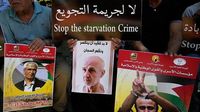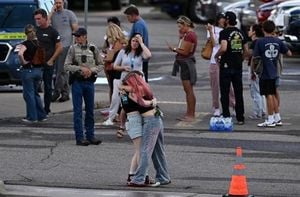On August 15, 2025, a video surfaced on social media showing Israeli National Security Minister Itamar Ben-Gvir confronting the imprisoned Palestinian leader Marwan Barghouti in his jail cell. The footage, which quickly ignited a firestorm of controversy, depicted Ben-Gvir berating Barghouti—a figure many Palestinians call their 'Nelson Mandela'—and vowing harsh reprisals against those who act against Israel. The incident has since drawn sharp condemnation from the United Nations and sparked protests in the West Bank, highlighting the deep and ongoing tensions between Israelis and Palestinians.
The video, shared on X (formerly Twitter), captured Ben-Gvir standing over Barghouti, who appeared noticeably older and gaunt, marking the first time the public had seen images of him in years. In a tone both confrontational and unyielding, Ben-Gvir declared, "Anyone who messes with the people of Israel, anyone who murders our children, anyone who murders our women, we will wipe them out." The precise timing of the video’s recording remains unclear, but its impact was immediate and profound.
Barghouti, now in his mid-60s, has been a central figure in Palestinian politics for decades. He was arrested in 2002 for his alleged involvement in anti-Israeli attacks during the Second Intifada, a period marked by intense violence and upheaval. In 2004, he was convicted and sentenced to five life terms on murder charges. Israel regards Barghouti as a terrorist, but among Palestinians, he is a symbol of resistance and hope. Polls consistently show him as the most popular Palestinian leader, and many see him as the natural successor to Mahmoud Abbas, the aging and increasingly unpopular leader of the Palestinian Authority.
For Barghouti’s family, the video was a gut punch. His wife, Fadwa Barghouti, herself a prominent Palestinian lawyer, described her reaction in stark terms. “It was shocking, painful and heartbreaking,” she said, adding that she “couldn’t even recognise” her husband at first glance. The footage, she warned, should serve as a “warning and a red flag for the Palestinian people and all international institutions: there are still acts of liquidation taking place inside Israeli prisons, posing a serious threat to the lives of Palestinian detainees.”
The United Nations Office of the High Commissioner for Human Rights (OHCHR) wasted no time in responding. During a press briefing in Geneva on August 19, OHCHR spokesperson Thameen Al-Kheetan condemned both Ben-Gvir’s behavior and the publication of the footage. “The minister’s behaviour and the publication of the footage constitute an attack on Barghouthi’s dignity,” Al-Kheetan stated. He went further, warning that such actions “may encourage violence against Palestinian detainees” and could “enable rights violations in Israeli prisons.” According to international law, all detainees must be treated humanely and with dignity, a standard the UN says was plainly violated in this case.
Ben-Gvir, a far-right figure in Israeli politics, is well known for staging provocative encounters with Palestinians, often courting controversy and drawing international criticism. His latest move, however, appears to have crossed a new line for many observers. The video not only showed a powerful government official confronting a high-profile prisoner but also seemed intended to send a message—both to Palestinians and to the broader world—about Israel’s approach to those it considers enemies.
The fallout was swift. On August 19, hundreds of protesters gathered in Ramallah, the West Bank’s administrative capital, to show their support for Barghouti. Waving flags and chanting slogans, demonstrators demanded better treatment for Palestinian prisoners and called for Barghouti’s release. Many carried signs likening him to South Africa’s Nelson Mandela, underscoring his enduring popularity and the symbolic weight he carries in the Palestinian struggle.
Barghouti’s status is unique. As a senior leader in Fatah, the secular movement led by Mahmoud Abbas, he played a key role during the Second Intifada and has remained a potent political force even from behind bars. Despite his incarceration, he consistently tops opinion polls as the preferred choice for Palestinian leadership—a fact that has not gone unnoticed by Israeli officials, who have shown no willingness to consider his release.
The video also cast a harsh spotlight on the conditions faced by Palestinian detainees in Israeli prisons. Israeli officials maintain that the conditions under which Palestinians are held meet the bare minimum required under both Israeli and international law. However, recent images of detainees released as part of ceasefire deals in Gaza have raised alarm: many appeared gaunt and ill, with some requiring immediate medical treatment upon release. These images, coupled with Barghouti’s visibly diminished appearance in the video, have fueled concerns about the treatment of prisoners and the adequacy of their care.
The broader context is grim. The Israeli-Palestinian conflict remains deeply entrenched, with violence, mistrust, and political deadlock defining the landscape. The Palestinian Authority, which governs parts of the West Bank, is widely seen as weak and ineffectual, while Hamas rules Gaza under blockade. In this environment, figures like Barghouti become rallying points for a people searching for leadership and hope amid adversity.
For the Israeli government, security remains paramount. Officials point to the deadly toll of the Second Intifada and ongoing attacks as justification for their hardline stance. Yet, critics argue that policies of isolation, harsh detention, and public humiliation only serve to deepen resentment and make the prospects for peace ever more remote.
Internationally, the incident has reignited debates about Israel’s obligations under international law and the role of the international community in ensuring the humane treatment of prisoners. The UN’s condemnation is unlikely to be the last word; human rights organizations and foreign governments may well weigh in as the story continues to unfold.
As the world watches, the fate of Marwan Barghouti remains a potent symbol of the broader struggle. The recent video, with all its raw emotion and political theater, has laid bare the deep wounds and unresolved tensions that continue to shape the lives of Israelis and Palestinians alike.
For now, the confrontation in a prison cell reverberates far beyond its walls, a stark reminder of the human stakes at the heart of a conflict that shows no sign of ending soon.





